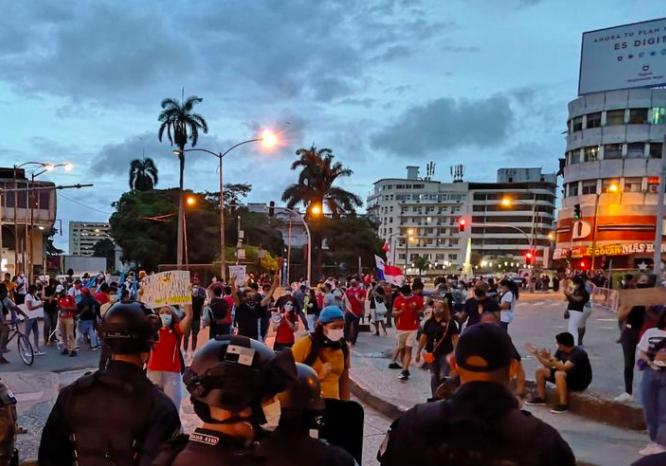Human Rights Watch questions journalists’ arrest

Following peaceful protests in Panama at the National Assembly The director of the Americas Division of Human Rights Watch (HRW), José Miguel Vivanco questions the attest of Juan Cajar.
Juan Cajar journalist for La Estrella was detained along with five university students, Raúl Conte, Andrés Conte, Cristopher Andrión, Heriberto Pérez and Sean Thorne.
According to the president La Estrella y El Siglo, SA (Gese) , Eduardo Quirós, Cajar remained in detention for more than five hours on Thursday night, despite the fact that President Laurentino Cortizo ordered his release.
He sites Law 18 of 1997, in which it is stated that the President of the Republic is the highest head of that institution. Cajar’s hearing was the delayed until November 2 as the judge had a medical appointment. The same delay occurred for the other five detainees.
Jorge Miranda chief of Police issued a statement yesterday with an apology to Cajar. In that statement it was stated that Cajar did not carry his press card at the time of his arrest, "nor did he have the recording or filming equipment used by press professionals."
The director of the Americas Division of Human Rights Watch (HRW), José Miguel Vivancos, said that the arrest of Cajar, was "arbitrary."
Read HRW questions Panama for ""covering up" police after journalist’s arrest in La Estrella here.
"The Panamanian police arbitrarily detained journalist Juan Cajar when he was covering a demonstration, although he repeatedly showed his credential. They accuse him of" disturbing public order. "How is it possible that @MinSegPma covers up the police claiming that he did not have identification?"
The director of the Americas Division of Human Rights Watch, José Miguel Vivanco , said that the apologies are not enough. He asked the Ministry of Security to guarantee that those responsible are punished and suspended.
"There have been situations that have repeatedly shown that the Police need training in respect of human rights and in the way in which peaceful demonstrations should be dealt with," said Quirós
Miranda apologized and promised that for next Monday’s hearing, they will not press charges against the reporter, as initially suggested. However, he referred to two versions that the judge would hear: that of the "police reports" and that of Cajar. He also denied that he will resign from office.
The reason for the protests in Panama
Juan Williams, one of the leaders of the protest in front of the Assembly explained the reason for the protests. 1) To remember that this month marks one year of the demonstrations against a list of constitutional reforms for Panama and to reject the "lack of citizen participation." in the approval. 2) this week the general budget was released 2021.
He added approaching the Assembly is not disturbing public order. "A group of young people at the fence was enough to unleash indiscriminate repression," he said.
Panama under examination on Human Rights
Among the topics under investigated are the violation of freedom of the press, police abuse and the right to protest.
The National Council of Journalism, the Forum of Journalists and the Panamanian Radio Broadcasting Association warned that Cajar’s arrest violates freedom of the press and expression.
Next Tuesday, November 3, the situation of human rights in Panama will be analyzed by the Universal Periodic Review (UPR) of the Human Rights Council of the United Nations (UN), in Geneva, Switzerland.
The UPR involves an examination of the human rights records of the 193 United Nations member states. On this occasion, according to a statement from the United Nations office in Panama, a UPR working group will evaluate 14 countries between November 2 and 13.
The first and second reviews of Panama’s UPR took place in November 2010 and May 2015, respectively.
